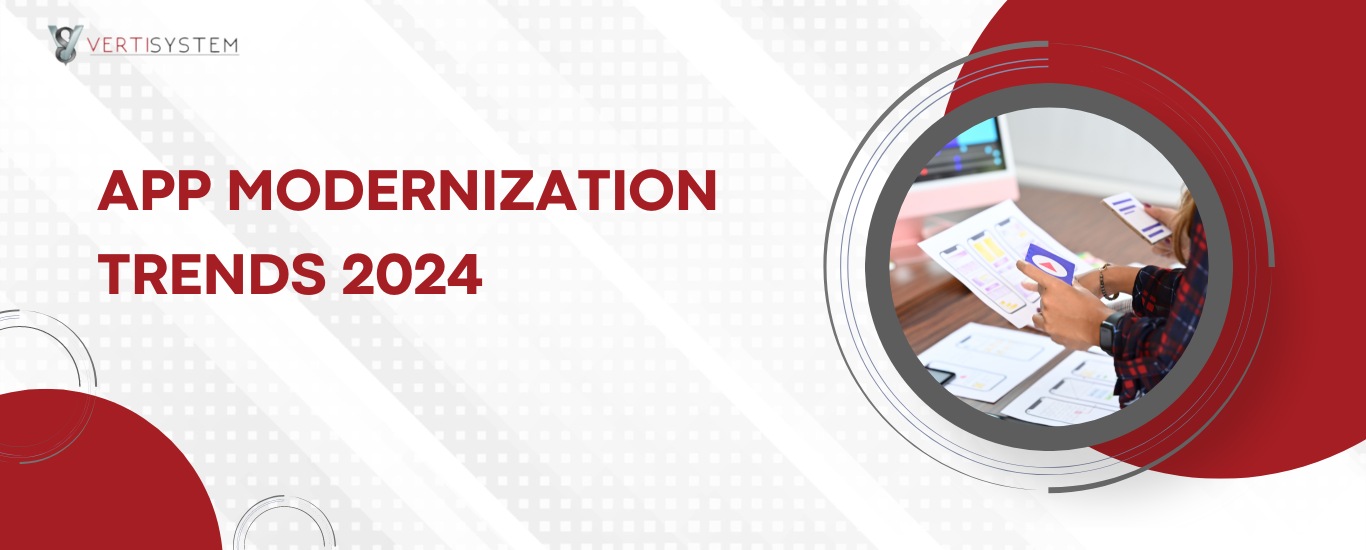Technological advancements and innovation have led enterprises to redesign existing processes and infrastructure due to the rapid shifts in market dynamics. This doesn’t hold true for all enterprises, and a lot of them continue to make use of legacy apps, making them lose out on multiple opportunities.
Staying ahead of the curve is crucial in the cut-throat digital market we live in today, and the right application software goes a long distance to help with that. App modernization software helps you to consistently meet customer requirements and expectations, helping your business stay relevant, competitive, and efficient.
What are App Modernization Services?
App modernization services involve improving and upgrading existing software applications so they can align with evolving requirements of customers. Legacy applications, in such a fast environment, can become a bottleneck in themselves without any modularity or adaptability to justify their costs.
Application Modernization Trends 2024
Fine tuning your existing applications is what app modernization is all about. Have a look at these top app modernization trends for 2024 that will help you future-proof your business for the time to come.
1. Low-Code/No-Code Development
The philosophy of no-code and low-code allows for simplified application development with its drag-and-drop interfaces. There’s no need for you to be an expert at coding, and you can update apps with significantly less coding effort.
While this trend is not really a new trend, the impact it has on the overall efficiency in development makes it powerful to continue for even this year and beyond.
2. Cloud-Native Applications
The evolution of cloud-native applications is another one of the top application modernization trends that we will see in 2024. Legacy application modernization has been bolstered by the adoption of cloud computing, because of which the demand for apps that are specifically designed to utilize the scalability of the cloud is also increasing.
These apps are built by using the microservices architecture, bringing better scalability and quicker time-to-market in the process. One of the biggest benefits of cloud-native apps is their capability to facilitate CI/CD practices. Developers can test, build, and deploy changes in code with pace and agility, allowing them to quickly deliver new updates.
3. The Use of Containerization
Enterprises often use technology stacks that serve specific purposes. Designing and developing an app for one system and then transferring it to the other for deployment can lead to unwanted bugs in the final deployment.
Containerization revolves around the objective that your apps perform consistently, without worrying about the tech stack it runs on. With Docker and Kubernetes being the preferred solutions, containerization is now one of app modernization best practices that teams are implementing.
4. Artificial Intelligence and Machine Learning
AI and ML have been changing everything that’s under the sun today, and the process of updating apps is one of them. These technologies have made the entire app development process smarter and quicker. As far as app modernization is concerned, AI/ML aids in automating code analysis, performance optimization, and testing.
AI-driven chatbots, recommendation engines, and predictive analytics are a few instances that offer a better user experience and facilitate the automation of decision-making.
5. DevOps Adoption
DevOps focuses on risk reduction, teamwork, and improving the overall software quality, something which had difficult workarounds in the case of legacy applications. Automation helps in reducing errors and increasing efficiency, controlling costs incurred in the process. DevOps experts use different tools to facilitate the easy transition of modernizing the legacy code as per requirements.
The process of modernization is made more effective with the integration of new technology like Infrastructure as Code (IaC), GitOps, and observability, making DevOps a trend to look forward to.
6. Robotic Process Automation (RPA)
For organizations seeking efficient and cost-effective solutions, Robotic Process Automation (RPA) is a great technology to adopt. It facilitates the automation of redundant activities without the need for significant initial investments or technical prowess.
Automation plays a key role in the context of legacy modernization, and RPA offers the perfect set of capabilities to make it happen. It not just saves time but brings a dramatic reduction in manual errors too.
How Vertisystem Transformed the Legacy Solution for an Education Brand with its App Modernization Services
Software modernization is one of the key service offerings at Vertisystem, and our app modernization experts are highly skilled in transforming monolithic, on-premises solutions to cutting-edge, cloud-enabled powerhouses that are highly flexible and can be scaled with time.
Click here to know about how we made legacy education software scalable with our education app modernization services.
To finish things off, it won’t be an understatement to say that 2024 is going to be a great year when it is about opportunities that businesses will have to move ahead quickly by making application modernization an integral part of their process.
Connect with our experts and understand exactly what you need to take your operations to the next level.

